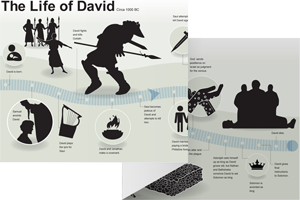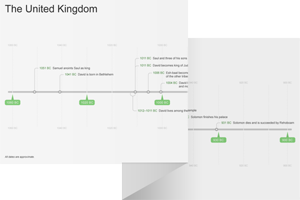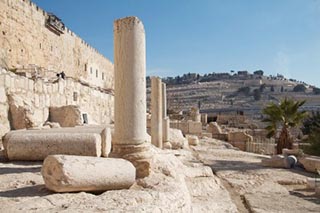5:1–16 Following Ish-bosheth’s death (2 Sam 4), all of the tribes of Israel submit to David as king. His first act as king of the newly united confederation is to move the capital to Jerusalem. He accomplishes this by ridding the city of the Jebusites and transferring his administration there. Yahweh blesses David’s efforts, establishes his royal residence, and multiplies his offspring. |
5:1 the tribes of Israel Refers to the northern tribes previously under the control of Ish-bosheth, son of Saul (see 2:8–10). Yet they pronounce to David that they are his kin, demonstrating the bonds between tribes.
5:2 were leading Israel in and out Referring to David’s leadership in battle (compare 1 Sam 18:5, 13, 16; 19:8).
shall be the shepherd of See 1 Sam 9:3 and note.
the leader The Hebrew word used here is nagid, which can also be translated “ruler.”
5:3 made a covenant See note on 1 Sam 11:1.
they anointed David as king David is anointed for a third time (see 1 Sam 16:13; 2 Sam 2:4).
5:4 he reigned forty years David reigns over Judah circa 1011–1004 bc; circa 1004–971 bc, David reigned over all of Israel, including Judah.
5:5 seven years and six months See 2:11 and note.
5:6 went to Jerusalem From this central location, David could unite the northern and southern tribes. See 1 Sam 17:54 and note.
Jebusites The Canaanite inhabitants of Jerusalem.
Ancient inhabitants of Jerusalem and its environs. They were sworn enemies of Israel and were among the people groups that God instructed the Israelites to obliterate (see Exod 34:11; Deut 7:1–2; 20:17). However, the Israelites were unable to drive the Jebusites out of the land (see Josh 15:63; Judg 1:21). |
blind and the lame The inhabitants of Jerusalem think that their city is impenetrable. They are so confident that no one can enter that they declare that their weakest citizens are all that is necessary to keep David out.
5:7 the city of David David renames the crown jewel of Israel after himself—a move that is not unparalleled in the ot (compare Num 32:41–42; 2 Sam 12:28).
5:8 water supply Possibly a reference to the subterranean waterway now known as Warren’s Shaft.
lame and the blind While this idea is difficult, it is possible to understand David’s statements not as an order to attack all lame (crippled) or blind people, but orders them to attack all Jebusites. The Jebusites had inadvertently characterized their whole city by its weakest members (see v. 6 and note). Now that David has conquered their city, he refers to all of its inhabitants by their initial taunt, turning it into a mocking epithet.
house The Hebrew text here, which simply refers to a “house,” may be a reference to the royal residence or to Israel’s place of worship (see Lev 21:17–23).
5:10 Yahweh the God of hosts The Hebrew title used here, yhwh elohe tseva’oth, which may be literally rendered as “Yahweh, God of hosts,” identifies the God of Israel, Yahweh, as a commander of armies—those of Israel and heaven.
5:13 wives from Jerusalem Though David breaks Yahweh’s command from Deut 17:17, Yahweh still blesses David with more offspring.
5:17–25 The text provides an example of Yahweh, the God of armies, fighting for Israel (see note on 2 Sam 5:10). |
5:17 the Philistines went up The Philistines intend to make war with him. They likely feel betrayed because he formerly lived among them and feigned friendship (1 Sam 27:1–28:2; 29:1–10).
 Battles of Saul and David Table
Battles of Saul and David Table
5:19 inquired of Yahweh As he did when making previous important decisions, David inquires of Yahweh. See 1 Sam 23:2, 4; 30:8; 2 Sam 2:1; note on 1 Chr 14:10.
5:20 Baal Perazim Means “The Lord of Bursting Forth.”
5:24 the sound of marching Indicates the presence of the heavenly army, led by Yahweh (see 2 Sam 5:10 and note).
5:25 just as Yahweh had commanded David’s actions again contrast Saul’s, who defied Yahweh’s commands and usurped His authority.
from Geba all the way to Gezer An overwhelming defeat spanning over 20 miles.

|
About Faithlife Study BibleFaithlife Study Bible (FSB) is your guide to the ancient world of the Old and New Testaments, with study notes and articles that draw from a wide range of academic research. FSB helps you learn how to think about interpretation methods and issues so that you can gain a deeper understanding of the text. |
| Copyright |
Copyright 2012 Logos Bible Software. |
| Support Info | fsb |
 Loading…
Loading…




 Jebusites
Jebusites 